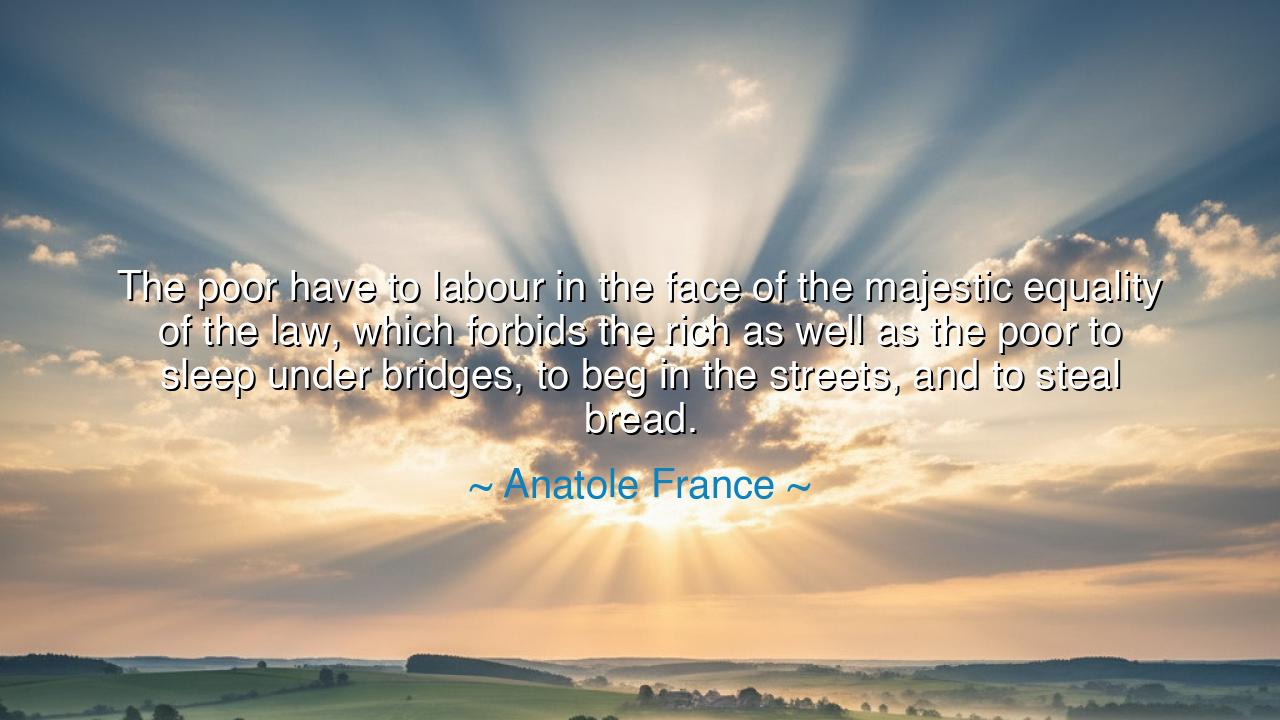
The poor have to labour in the face of the majestic equality of
The poor have to labour in the face of the majestic equality of the law, which forbids the rich as well as the poor to sleep under bridges, to beg in the streets, and to steal bread.






The words of Anatole France — “The poor have to labour in the face of the majestic equality of the law, which forbids the rich as well as the poor to sleep under bridges, to beg in the streets, and to steal bread.” — strike with the sharpness of irony and the sorrow of truth. Beneath their polished wit lies a thunderous critique of a world that cloaks its injustice beneath the robes of fairness. In this sentence, France exposes the hypocrisy of equality without compassion, the empty glory of laws that claim to treat all men the same while ignoring the vast gulfs that separate their fates. His words, though written in the 19th century, still echo in every age where privilege is defended in the name of order and poverty is punished in the name of justice.
Anatole France, the French novelist and Nobel laureate, wrote these words in his work Le Lys Rouge (The Red Lily, 1894), during a time when Europe boasted of its enlightenment but remained bound by invisible chains of class and wealth. With delicate sarcasm, he revealed that a law that ignores inequality only deepens it. To forbid both the rich and the poor from “sleeping under bridges” is, on the surface, equality — but in truth, it is absurd, for the rich have mansions and the poor have nowhere else to rest. Thus, France shows that when justice is blind not to prejudice but to suffering, it becomes a cruel mockery of itself.
In the wisdom of the ancients, justice was symbolized by a scale — balanced, fair, and discerning. Yet France’s words remind us that balance means nothing if the weights upon the scale are already uneven. The rich and powerful stand secure, never tested by the laws they help create, while the poor and powerless are crushed beneath their impartiality. The law, like a mighty tower, may stand tall and proud, but what does it matter if its foundation is laid upon inequality? True justice, he teaches, is not sameness — it is understanding, the recognition that fairness must account for the burdens each soul carries.
Consider the ancient tale of Jean Valjean, the poor man immortalized by Victor Hugo, who was imprisoned for stealing a loaf of bread to feed his starving family. The law condemned him without mercy, claiming equality — for theft, it said, is wrong no matter who commits it. Yet in this “majestic equality,” the hunger of the poor man counted for nothing, and the greed of the rich went unpunished. In that moment, law became not the guardian of morality, but its betrayer. France’s quote speaks precisely to this tragedy: that justice without empathy is a sword that strikes only the weak.
Anatole France’s irony burns with timeless clarity. He does not merely mock the legal system of his day; he unmasks a flaw at the heart of civilization itself — the tendency of the privileged to craft systems that preserve their comfort under the guise of universality. The poor labour, he says, not only in fields and factories but also under the burden of rules made for those who will never need them. The “majestic equality” of the law forbids the rich and poor alike from begging, yet only the poor must beg. It forbids both from stealing bread, yet only the hungry feel the bite of starvation. Thus, what appears as fairness is but the illusion of justice — a mirror polished so that the powerful may see their own virtue reflected back at them.
Through these words, France speaks to all generations: beware the kind of equality that demands the same from those who do not stand on the same ground. True equality does not mean equal rules, but equal dignity. The law must not only restrain but uplift; it must not only punish, but protect. For what good is a law that guards the wealthy from discomfort while offering the poor only the privilege of suffering legally? To achieve justice, one must look not merely at the letter of the law, but at its heart — to ask not “Is this fair?” but “Is this merciful?”
And so, my children, remember this teaching: when you see a law or custom that claims to be equal, look deeper — for sometimes equality is a cloak that hides indifference. Seek instead equity, the wisdom that gives more where there is less, and eases where the burden is greatest. Stand not with the towers of pride, but with the bridges beneath them, where the forgotten sleep. Use your voice, your labor, your compassion to mend the balance of the world.
For as Anatole France taught, justice that does not see the suffering of the poor is not justice at all — it is only majesty without mercy, power without purpose, law without love. And no society that mistakes such illusion for righteousness shall ever be truly free or fair.






AAdministratorAdministrator
Welcome, honored guests. Please leave a comment, we will respond soon